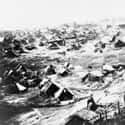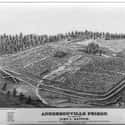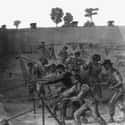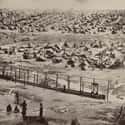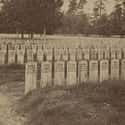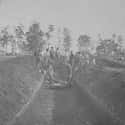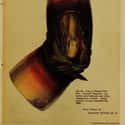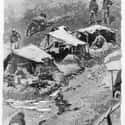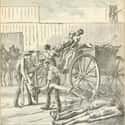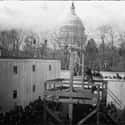-
(#1) Barefoot And Naked Prisoners Struggled To Survive
Thousands perished at Andersonville. At the prison's peak, 100 men passed each day from diseases, malnutrition, and exposure.
Union Private Prescott Tracy, an Andersonville prisoner, described the terrible conditions: "The clothing of the men was miserable in the extreme. Very few had shoes of any kind, not two thousand had coats and pants, and those were latecomers. More than one-half were indecently exposed, and many were naked."
POWs often had no protection from the elements: "Our only shelter from the sun and rain and night dews was what we could make by stretching over us our coats of scraps of blankets, which a few had, but generally there was no attempt by day or night to protect ourselves."
-
(#2) The 'Dead Line' Kept POWs From Escaping
Union POWs at Andersonville rarely escaped. The Confederate forces guarding the prison set up a "dead line" to keep POWs in the camp.
Enlisted soldier John Levi Maile described the barrier: "It consisted of a narrow strip of board nailed to a row of stakes, about four feet high." The dead line completely encircled Andersonville.
"'Shoot any prisoner who touches the dead line' was the standing order to the guards," Maile explained. "A sick prisoner inadvertently placing his hand on the dead line for support... or anyone touching it with suicidal intent, would be instantly shot at, the scattering balls usually striking other than the one aimed at."
-

(#3) POWs Were Fed Starvation Rations
POWs at Andersonville ate cornbread made from ground corn cobs and four tablespoons of rice per week. When they received meat, it was "condemned pork, offensive in appearance and smell."
Private Prescott Tracy described the Confederates dumping rations onto the ground at 4 pm: "It was the custom to consume the whole ration at once, rather than save any for the next day. The distribution being often unequal, some would lose the rations altogether."
Starvation rations began even before POWs reached Andersonville. Tracy related that on a five-day march to Andersonville, Union troops received barely any food: "The sum of our rations for the five days was thirteen crackers."
-
(#4) The Only Water Was Contaminated With Sewage
The 45,000 inmates at Andersonville shared a single water source: a manmade channel that trickled through the camp. "The water is of a dark color, and an ordinary glass would collect a thick sediment," reported Private Prescott Tracy.
"The cookhouse was situated on the stream just outside the stockade," Tracy wrote, "and its refuse of decaying offal was thrown into the water, a greasy coating covering much of the surface."
Upstream, the Confederate guards also contaminated the water. Tracy described guards dumping "a large amount of the vilest material" into the stream, "or more properly sewer." The stream was the only source of drinking and cooking water for the POWs at the camp.
-
(#5) Confederate Guards Inflicted Cruel Punishments On The POWs
Inmates caught stealing from others might be put in the stocks or forced to wear a ball and chain. Already starving POWs might be "deprived of the ration" if a single man was missing at roll call.
Union prisoner John L. Ransom watched Confederate guards shoot a sick POW. The feverish and half-dressed man deliberately walked to the edge of the camp, where "the guard fired, sending a ball through his brain, and the poor fellow fell in the ditch."
Ransom wrote, "Perhaps he is better off, and a much easier death than to die of disease, as he undoubtedly would in a few days longer."
-
(#6) Going To The Medical Tents Almost Guaranteed An Inmate's Demise
Between February 25 and May 9, 1864, a total of 4,588 patients visited the Andersonville prison hospital, and 1,026 perished.
Prisoner Prescott Tracy worked as a clerk in the Andersonville hospital. He reported:
I have seen one hundred and fifty bodies waiting passage to the "dead house," to be buried with those who died in hospital. The average of deaths through the earlier months was thirty a day; at the time I left, the average was over one hundred and thirty, and one day the record showed one hundred and forty-six.
The major threats in the prison camp were diarrhea, dysentery, and scurvy.
-
(#7) The Camp Was Overcrowded And Relied On Mass Graves
Prisoner Prescott Tracy described his arrival to Andersonville: "On entering the Stockade Prison, we found it crowded with twenty-eight thousand of our fellow soldiers. By crowded, I mean that it was difficult to move in any direction without jostling and being jostled."
So many perished that POWs were forced to bury their comrades in mass graves. Soldier Albert Harry Shatzel wrote in his diary, "Maney [sic] is the man that goes to sleep & never wakes up again..." Men were found lifeless so frequently that prisoners would carry "from 25 to 30 dead men every day." Shatzel grimly described the procedure of carrying out the remains, putting them in a hole, and covering them up with a board.
-
(#8) POWs Suffered From Gangrene And Other Diseases
Under the horrific conditions, the health of Union prisoners deteriorated.
Dr. John M. Howell, acting assistant surgeon at Andersonville, described in detail what he saw when he arrived: "Such objects in the way of men I never saw before. Sick and emaciated, naked, ragged, and dirty - some on straw with a blanket under them - some without either." Assessing the men, Howell found "some that will die tomorrow, some today - some dying with another whose face is turned toward him breathing his last."
Howell continued, "I saw too some awful cases of gangrene - cases where the flesh has been destroyed to the bone. But before you can imagine such pictures, you must first see some sufferings like these. I can give you no idea of them. In comparison an ordinary death is pleasant to contemplate.”
Union prisoner Ezra Ripple recalled, “Short of death, the thing we most dreaded was gangrene." Decades later, Ripple still remembered how the “bones would protrude white and glistening” when surgeons amputated gangrenous limbs.
-
(#9) Lives Were Threatened By The Terrible Heat
In the summer, heat made Andersonville even more deadly. Private Ezra H. Ripple wrote about the scorched area, where "not a particle of vegetation could be seen." Men created shade from makeshift tents. Ripple and eight other men tried to escape the sun with their feet "sticking outside like the spokes of a wheel."
POW Albert Harry Shatzel paid particular attention to the horrific smell in his diary of that time: "It's terible [sic] hot here in the sand & the stench that arises from the filth in here is enough to suffocate aney [sic] comon [sic] man. I went out & took a view of the camp & Prisoners & I dont [sic] think there ever was sutch [sic] misery on gods [sic] earth before..."
-
(#10) Andersonville Was 'Hell-Upon-Earth'
Samuel J. Gibson, a Union soldier held at Andersonville, described the camp as a "Hell-upon-earth of a Prison." Gibson wrote, "Our condition is daily growing more disagreeable as the weather grows warmer." Three of Gibson's four comrades were sick, and as the days passed, Gibson recorded their passing in his diary.
Several weeks later, Gibson added, "If this is not Hell itself, it must be pandemonium; which is only Hell Gate. Heaven forbid I should ever see a worse place."
-
(#11) The Prison Was Tightly Secured, With Nightly Fires To Prevent Escape
The men held at Andersonville tried to escape. John Levi Maile, an inmate at Andersonville, described attempts to tunnel under the wall. POWs dug at night and carried away the fresh dirt in their pockets, letting it fall as they walked the camp during the day. Sick inmates lay over the holes during the daytime so Confederates wouldn't discover the plots.
But the Confederate guards came up with a new way to prevent tunnel escapes. "Slaves and teams were employed to build piles of pitch-pine along the cleared space beyond the outer stockade," Maile described. "At night, when these were lighted, a line of fires was made which illuminated a wide area."
The fires made life at Andersonville even more terrible. Maile wrote, "From these fires arose columns of dense smoke, which in the sultry air of a midsummer night hung like a pall over the silent city of disease and starvation."
-
(#12) POWs Had To Bury Members Of Their Squads
When POWs perished, their comrades had to bury them. Union soldier Prescott Tracy wrote, "The work of burial is performed by our own men, under guard and orders, twenty-five bodies being placed in a single pit, without headboards, and the sad duty performed with indecent haste."
POWs might earn a reward for burial duty: "Sometimes our men were rewarded for this work with a few sticks of firewood, and I have known them to quarrel over a dead body for the job."
Inmates were so desperate to escape that some even pretended to have perished. POW John Ransom wrote, "A funny way of escape has just been discovered by [Andersonville Commander] Wirz. A man pretends to be dead and is carried on a stretcher, left with the row of the dead. As soon as it gets dark, Mr. Dead-man jumps up and runs."
-
(#13) The Confederates Offered Freedom In Exchange For An Oath Of Allegiance
The 45,000 Union prisoners at Andersonville could escape the horrific conditions, but it came at a high price.
The Confederates offered freedom and money for any Union soldier who took an oath of allegiance to the Confederacy. Prescott Tracy reported, "It was very rare that their patriotism, even under such a fiery trial, ever gave way."
Tracy reported that one man sent this message to his mother: "My treatment here is killing me, mother, but I die cheerfully for my country."
-
(#14) The Commander Of Andersonville Was Executed
When the Civil War ended, news of the atrocities at Andersonville horrified Northerners. After meeting with surviving POWs, Walt Whitman wrote, “There are deeds, crimes that may be forgiven, but this is not among them.”
Much of the blame fell on Henry Wirz, the commander at Andersonville beginning in 1864. After the conflict, Wirz was detained and put on trial for war crimes. More than 100 witnesses testified in the trial. Wirz was blamed for the loss of thousands of Union men and received a sentence of capital punishment.
On November 10, 1865, Wirz met his end in sight of the capital building. Just before his hanging, Wirz told the officer overseeing the job, “I know what orders are, Major. I am being hanged for obeying them.”
New Random Displays Display All By Ranking
About This Tool
Camp Sumter was known as one of the most notorious and cruel prisons in the Civil War, known for its overcrowding, insufficient food and water supply, and rampant death and disease. Nearly a third of the 45,000 Union soldiers held in prison died during detention. The 19-foot fence erected around the prison is called the "death line", and any prisoner who tries to cross or touch the fence will be shot immediately.
Nowadays, tourists from all over the world can visit the historic Andersonville Prison on foot or in a sightseeing car. People should remember this dark history. The random tool help us to know 14 facts about the brutal life in Camp Sumter.
Our data comes from Ranker, If you want to participate in the ranking of items displayed on this page, please click here.











